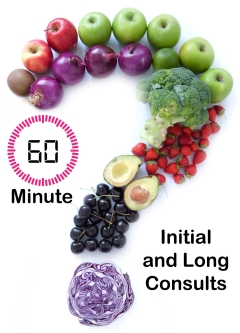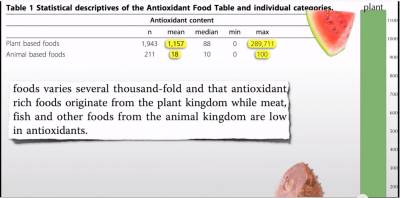DrCarney.com Blog
Eggs Contain Few Antioxidants
Which food contains more antioxidants - eggs or whole plant foods? Eggs are marketed for containing high levels of antioxidants, which play an important role in fighting disease. The egg industry boasts: "One egg has 13 essential vitamins and minerals in varying amounts, high-quality protein, and antioxidants, all for 70 calories." But are they really an excellent source for antioxidants?
Let's take a closer look at the significant levels that eggs are marketed to have. A quick search on the internet reveals dozens of websites touting the benefits of the antioxidants found in eggs. If you dig a little deeper though, you will find that the highest levels of antioxidants are found in whole plant foods and that "Eggs are almost devoid of antioxidants..."
A published study that measured the total antioxidant content of over 3,100 foods states: "When classifying the samples into the three main classes the difference in antioxidant content between plant- and animal-based foods become apparent. The results here uncover that the antioxidant content of foods varies several thousand-fold and that antioxidant rich foods originate from the plant kingdom while meat, fish and other foods from the animal kingdom are low in antioxidants. Comparing the mean value of the 'Meat and meat products' category with plant based categories, fruits, nuts, chocolate and berries have from 5 to 33 times higher mean antioxidant content than the mean of meat products. Diets comprised mainly of animal-based foods are thus low in antioxidant content while diets based mainly on a variety of plant-based foods are antioxidant rich, due to the thousands of bioactive antioxidant phytochemicals found in plants which are conserved in many foods and beverages." Notice that cake frosting and doughnuts are higher in antioxidants than dairy or eggs. (Page 32, 34, and 38). To view the entire report, scroll all the way down to the heading "Supplementary Material," then click on "Click here for file."
Dr. Michael Greger's video regarding this comprehensive study illustrates how the maximum antioxidant content in animal foods is 100, while plant foods goes up to 289,000. Another video that compares antioxidant content can be seen here. On average, plant foods contain 64 times more antioxidant power than animal foods.
Selenium
Selenium is another essential mineral that functions as an antioxidant. Although eggs are promoted as being an "excellent source" for their selenium content, one large egg contains a mere 15.4 mcg compared to approximately 80 mcg in one Brazil nut.
Antioxidant Content - Eggs vs Plant Foods
USDA scientists analyzed antioxidant concentration in more than 100 different foods. The findings were published in the June 9, 2004, issue of The Journal of Agricultural and Food Chemistry. The top foods scoring the highest in antioxidant content can be seen here. Notice that eggs (or in fact, any animal product) do not even make the list. Another method of rating antioxidant levels is by using the "Oxygen Radical Absorption Capacity" (ORAC) system. The ORAC values of the highest rating foods can be seen in the USDA Database of Selected Foods. If you scroll all the way through the report, you'll notice once again that there's not a single animal product listed. The report states: "Diets rich in fruits and vegetables are considered to be an excellent source of antioxidants. Some minerals and vitamins have a role as dietary antioxidants. These include vitamin C, vitamin E, and selenium." (All of which are plentiful in plant foods.) This report clearly demonstrates that whole plant foods offer superior protection against disease, not animal products. Remember, the two reports mentioned above were both analyzed and published by the USDA.
Lutein and Zeaxanthin
Eggs are also well publicized for their lutein and zeaxanthin content. Lutein and Zeaxanthin are carotenoids contained in many foods that play an important role in protecting our vision. These nutrients reduce the risk of cataracts and age-related macular degeneration, which is the leading cause of blindness in those who are 65 years and older.
According to the egg industry, "Lutein and Zeaxanthin, two antioxidants found in egg yolks, help prevent macular degeneration, a leading cause of age-related blindness." "A large egg yolk contains 252 mcg of lutein and zeaxanthin. Research has shown that, due to the egg yolk's fat content, the yolk's lutein and zeaxanthin may be more easily absorbed by the body than the lutein and zeaxanthin from other sources." However, the evidence below demonstrates how eggs are a poor source of lutein-zeaxanthin when compared to plant foods
Dr. Greger explains that eggs are marketed as being rich sources of these two carotenoids. He says, "The egg industry loves to boast that eggs have these two compounds, that appear so protective against cataracts and macular degeneration. What the industry does is feed hens yellow corn, alfalfa, even marigold petals, anything to boost the egg content up to 166 mcg per large egg." Eggs can have up to 250 mcg per egg, but 1 cup of carrots has over 1,000, a single serving of collard greens contains 15,000 and a serving of kale nearly 24,000 mcg. One spoonful of spinach has as much as 9 eggs. To protection our vision, the recommendation is to get 10,000 mcg a day. To achieve this, one would need to eat either 1/3 cup spinach or 40 eggs every day. The top ten sources of these two nutrients are all found in green vegetables. Dr. Greger's video demonstrating how "Eggs don't even make the top 100 food sources" can be seen here. Watch how far down the list eggs are. According to the USDA, eggs come in right behind Captain Crunch With Crunchberries. "There are more phytonutrients in crunchberries than there are in eggs." The highest concentration of Lutein and Zeaxanthin can also be seen here. After seeing these figures, the 166-252 mcg found eggs doesn't even come close to the concentration in green vegetables.
There are false and misleading advertising laws that prevent the egg industry from claiming that eggs are a good source of lutein (due to the insignificant amount) in an ad or on egg cartons, however they can make this statement on a website or TV. The USDA reminds the egg industry that they "Can't say it helps people with macular degeneration."
Although big industries promote eggs as being an excellent source for many nutrients, the evidence proves otherwise. Eggs offer minimal antioxidant protection when compared to whole plant foods. Choose wisely...choose foods that aren't promoted by large profit-driven special interest groups...choose plants!
For more information regarding the myths associated with the healthfulness of eggs, see our topic article Unscrambling the Truth About Eggs.
Scroll Down Page to Leave Comments

What Have You Got to Lose?
Fight the Obesity Epidemic! We provide Starch-Smart Support through our Helpful Sharing Community, Discussion Forums, and Blogging Platform.
One Hour Phone Consult with Dr. Carney

Telephone Food Coaching Sessions with Linda Carney MD
Due to demand for nutritional advice, Dr. Carney's offers Starch-Smart® System "Dietary Care Extraordinaire" Food Coaching telephone sessions. The first sessions is always one hour. Subsequent sessions can be thirty minutes or one hour:
Click Here For 60 Minute Food Coaching Session
Please Note: Food Coaching sessions are not medical appointments and are not intended to replace your own physician. No tests will be ordered and no prescriptions will be provided.
When you subscribe to the blog, we will send you an e-mail when there are new updates on the site so you wouldn't miss them.




